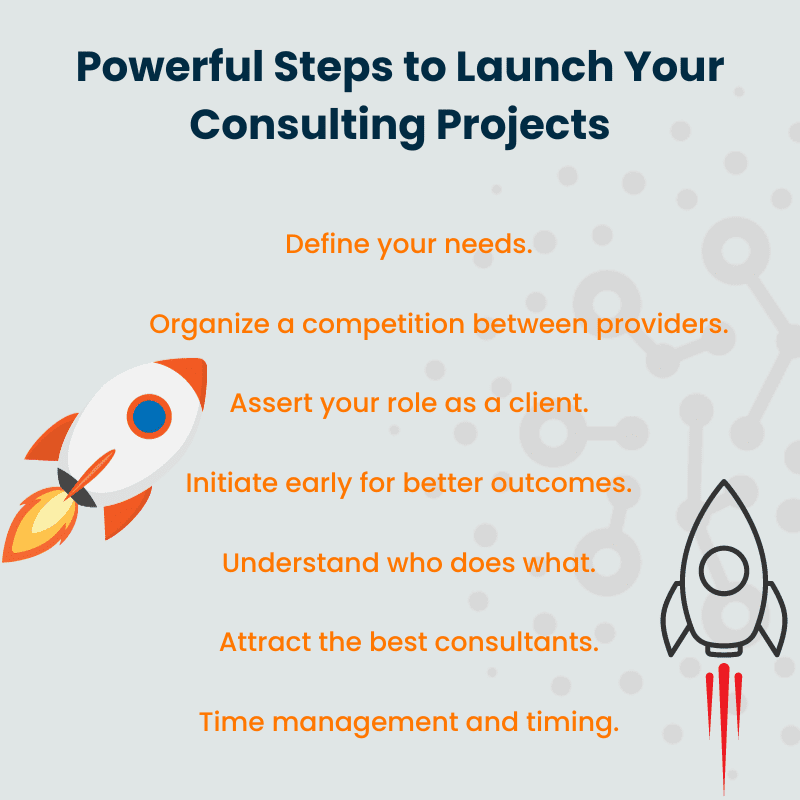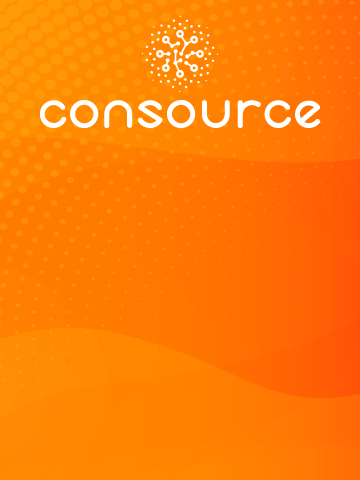Embracing the words of Benjamin Disraeli, “As a general rule, the most successful man in life is the man who has the best information,” becomes not only a guiding philosophy but a strategic imperative when considering the launch of your consulting project.
This principle, as timeless as it is profound, holds true across the myriad tapestries of business, strategy, and life itself. Within the intricate realms of the consulting world, where you’re preparing to launch your consulting project, this wisdom becomes particularly salient.
While consultants may dazzle with their expertise and jargon, clients sometimes find themselves in the shadows, striving to pull themselves into the light of understanding, especially as you set out to launch your consulting project.
This isn’t a narrative of doubt cast upon the expertise of consultants or the discernment of clients, but rather an acknowledgment of the often subtle but significant imbalance of knowledge that exists between them.
Today, we embark on a journey to demystify this balance, offering insights and tools to navigate the intricate dance of client-consultant dynamics with grace, discernment, and, of course, informed power.
Asymmetrical Information: Its Impact and Why It Matters
Asymmetrical information, otherwise known as information failure, refers to a situation when one party in a transaction has more information, than the other party. Almost all economic transactions involve some information asymmetries.
Asymmetry in Client-Consultant Dynamics
Asymmetrical information is particularly present when it is difficult for the client to judge the quality of the product or service. In Consulting, partners and consultants know their industry and their trade inside out, while the clients and their buyers have limited information.
You might be familiar with the work of George Akerlof “The Market for Lemons”, where he explained that in certain markets, it’s difficult to distinguish the good product (“pears”) from the bad product (“lemons”).
To mitigate the risk, the buyer will use the average statistics of the market while the seller has detailed information for each product.
The seller will tend to sell the product of lower quality to minimize their losses, and the best product won’t be sold. As a result, the market will shrink, and the average product quality will decrease.
Navigating the Asymmetrical Information in Consulting
Asymmetrical information in consulting is a classic challenge. Many clients grapple with comprehending the intricacies of the consulting world, and often, procurement teams are even less informed.
While former consultants may possess a deeper understanding, their perspective is frequently partial, limiting their view of the entire landscape. Despite being marginally better equipped, they too can be caught in the pitfalls of this information disparity.
Recognizing and navigating these dynamics is crucial for clients to ensure they make informed decisions in their consulting endeavors.
Unless they are handling several consulting projects a month in each capability, buyers of consulting services are at a disadvantage when negotiating with consulting providers.
As a result, they might become risk-averse in their choice of consulting providers and choose consulting firms based on mostly their reputation or their existing relationship.
The winners then are the large consulting firms that provide constant high-quality work and are excellent at building relationships.
Strategies to Counteract Disadvantages in Consulting Procurement
To navigate these murky waters and ensure you’re making the best decisions for your organization, several strategies can be employed.
First and foremost, a thorough research of the market is indispensable. By understanding the overall layout of the consulting industry, from its key players and emergent trends to niche areas, clients can gain a foundational knowledge that can be instrumental in decision-making.
This also extends to pricing. By familiarizing oneself with prevalent pricing models and cost structures, clients can not only budget better but also position themselves more advantageously during negotiations.
However, understanding the consulting industry doesn’t stop at its structure or pricing. It’s equally crucial to comprehend the nature of consulting work itself. Differentiating between various services, be it strategy, operations, or IT consulting, ensures that needs are matched precisely with what’s on offer.
Moreover, having a clear picture of a consulting project’s typical lifecycle, right from the diagnostic phase to implementation and subsequent follow-up, can demystify many aspects of the engagement.
Lastly, and perhaps most importantly, there’s no substitute for expertise. Engaging with those who have trodden the path before, seeking mentorship, or simply collaborating with industry veterans can offer invaluable insights.
Launch Your Consulting Project: 7 Proven Steps
If you are confident that you would like to launch a consulting project, then these are the most effective steps to follow:

1. Define Your Needs
The definition of the scope of your project is a compulsory step in the RFP (Request for Proposal) process. You need to gather a team made of the major stakeholders and agree on the expected results, timeline, and budget for the project.
Even though you are thinking of bringing in external resources to lead the project, the sound principles of project management still apply.
Determine the real problem to solve and the project objectives. Many consulting projects fail because the scope is too vague and too broad.
2. Organize a Competition Among the Prospective Providers
Organizing a healthy competition is not that complex. You have to keep in mind that the goal of the process goes beyond the sourcing and focus on the success of the project.
Organizing a competition without putting all the candidates in the right conditions to give their best answer is meaningless. You need to bring in relevant potential consulting suppliers and give them a fair chance to get the project.
3. Assert Your Role as the Client
Don’t let the consulting firm dictate the pace or the content of the conversation. Explain your process beforehand. They need to give you one contact person, and to comply with your rules.
The same applies to Terms & Conditions.
Work with your documents based on your internal policies. Define, for instance, your rule for Travel expenses: Expenses capped at 15%, pre-approved by your teams, and based on your Company policy. Be fair to all consulting firms and apply the same to rules to everyone.
4. Initiate Early for Better Outcomes
Most of the time, you are not in such a hurry. When projects are complex, integrate Q&A sessions in the process. In all cases, give the consulting firms enough time to prepare their proposal. They will only be more detailed.
Generally, response turnaround times should be in the range of one week for a small project, two weeks for a standard consulting project and three to four weeks for a very large project (PMI, company-wide transformation, etc).
Anticipate also spending some extra time for back-and-forth communication with the consulting providers to adjust the proposals
5. Understand Who Does What
When buying consulting services, each player has a distinct role, and understanding this can make the difference between success and missed opportunities.
Business lines are the heartbeat of an organization. They’re closest to the challenges and have a rich understanding of what needs to be addressed, the expertise required, and the history of past endeavors. They are the ‘why’ and ‘what’ of a project.
Procurement, on the other hand, is the ‘how.’ They have the expertise to articulate these needs clearly to external consultants, draft precise requirements, and lead negotiations. Their role is to ensure the project is feasible, cost-effective, and in line with organizational objectives.
In a nutshell, while business lines provide the context, procurement brings structure. Recognizing and leveraging the strengths of each ensures effective and impactful consulting engagements.
6. Attract the Best Consultants
If you decide to work with consultants, you are interested in their analytical skills, their expertise or their outstanding communication competencies. Don’t waste their talent (and your money) on menial tasks.
They are better employed at complex projects where they can do their magic. Besides, they might not be interested in working on small projects, and your project could go down on their priority list. And it might not be ‘good news’ in regards to quality and expertise.
If you are looking more for another pair of arms, a one-person project, or data crunching, you might prefer freelance platforms such as Catalent, TalMix, even networks like A-Connect or Eden McCallum. You will find bright individuals ready to take on very small projects or interim work.
7. Time Management and Timing
If you can afford it, take your time. It is sometimes difficult to translate the business challenges and the needs into a project. You might not be sure even if the project will happen, or have a clear scope in mind.
The RFI (Request for Information) can be a good way to collect and leverage information. It will help you refine your approach to solving the problem and develop consensus within your organization.
It can also be a smart way to narrow the number of contestants on your list before engaging in the RFP process. Be careful to give a fair chance to all the consulting firms you engaged in your RFI, so your company is not seen just as a brain picker.
When the scope is clear, you can take an educated guess at how many consultants you need for the project. You can also think about the value expected from the project. That should help you define ballpark how much you are ready to pay for that project.
Conclusion
In business and strategy, it’s clear: knowledge is power. Whether you’re diving into the world of launching your consulting project or just managing daily tasks, having the right information is essential.
But you don’t have to go it alone. Working with skilled partners, whether they’re in procurement or external specialists, can help you launch your consulting project and steer you in the right direction.
It’s not just about getting services or advice; it’s about making sure every move you make, especially when launching your consulting project, adds real value. In a world filled with options, let knowledge and teamwork be your guiding lights when launching your consulting project.
After all, the best results come when informed minds come together to launch your consulting project.
launch your consulting project launch your consulting project launch your consulting project
launch your consulting project launch your consulting project launch your consulting project
launch your consulting project launch your consulting project launch your consulting project
launch your consulting project launch your consulting project launch your consulting project
launch your consulting project launch your consulting project launch your consulting project

How Consource Can Help?
Consource can assist you to expedite consultant sourcing by 50% using our smart user interface, self-service portal, and templates libraries. With Consource you can source the best value-for-money consultants through competition by combining your panel and our network.








0 Comments